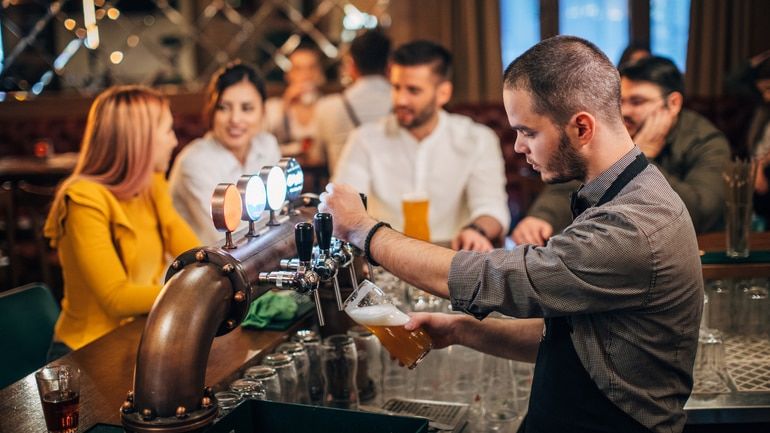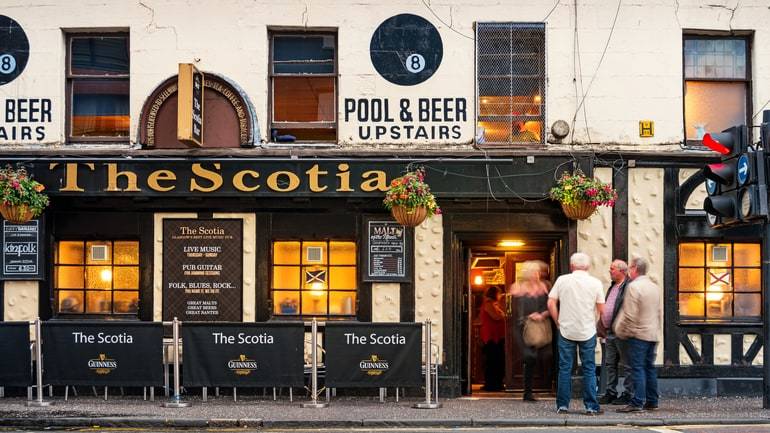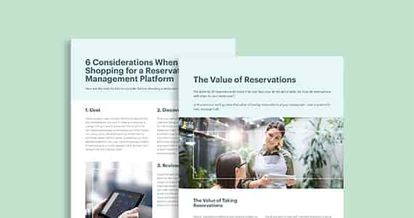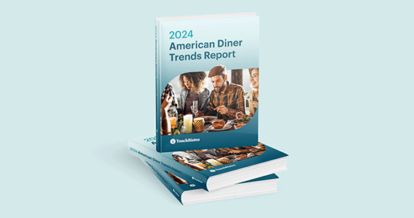When you dreamed of opening your restaurant, you probably didn’t give much thought to restaurant licenses and permits. You were too busy hunting for the perfect location, crafting your menu, and recruiting your dream team.
And who could blame you? No one gets into the restaurant industry to navigate mountains of paperwork and red tape!
But while restaurant licenses and permits aren’t exactly fun, they’re crucial to getting your restaurant up and running. Even if you’ve already opened your doors, it’s important to stay on top of your restaurant licenses to keep your business on the right side of the law.
That’s where this article comes in. No matter where you are in the process, we’ll cover everything you need to know about restaurant licenses, including:
- Why restaurant licenses are so important
- The essential licenses you need to open your restaurant
- Extra licenses you may need to run your restaurant
- A downloadable guide to restaurant licenses and permits

Know exactly how to get each license and how much it’s going to cost.
Why Are Restaurant Licenses So Important?
Even if this is your first restaurant, it’s not hard to understand why some restaurant licenses are so important. For instance, a food service license ensures that restaurants adhere to proper food safety standards. Without these standards, public health could be at risk.
But when it comes to other restaurant licenses, such as sign permits and music licenses, you’re probably thinking: “Are all those licenses really necessary?”
The answer is yes.
From your liquor license to your dumpster placement permit, all restaurant licenses are important to the success of your business. If you fail to obtain the necessary licenses to open and operate a restaurant, you could be hit with hefty fines and penalties. And in an industry where profit margins are razor-thin, one major fine could spell disaster for your restaurant.
With that being said, let’s dive into which licenses you’ll need to keep your business legally compliant and fine-free.

The Essentials: Licenses You Need to Open a Restaurant
If you’re gearing up to open a restaurant, you’ll want to pay attention. Before you can even open your doors, you’ll need these restaurant licenses and permits:
1. Business License
If you want to open or operate any business in the U.S., you’ll need a business license. Issued by the government, this license legitimizes your business and gives you the authority to legally operate in a specific state, city, or country. The tricky part is that the process and cost of obtaining a business license varies based on where your restaurant is located. And keep in mind that you’ll need to renew your license annually so pay attention to deadlines.
2. Employer Identification Number (EIN)
In addition to a business license, all businesses also need an employer identification number (EIN) to operate legally in the U.S. Your EIN is essentially a tax ID number that’s assigned by the IRS. Keep in mind that the IRS issues just one EIN per day, so you’ll want to start this process as early as possible.
3. Food Service License
Your food service license is another license that you can’t open your doors without. This license is generally issued by your city or county health department, which will send inspectors directly to your restaurant. These inspectors will make sure that your restaurant meets all the required food preparation, food storage, and food safety regulations.
Once you have a food service license, the health department will regularly send inspectors to your venue to ensure you’re still in compliance. If you ever fall short of these food safety regulations, you could have your license revoked.
Keep in mind that your food service license may expire so you should make sure you understand the renewal process from the beginning.

Know exactly how to get each license and how much it’s going to cost.
4. Liquor License
While your food service license covers all those delicious dishes you plan to serve, it doesn’t cover any of your alcohol (no matter how creative you get with your cocktails). If your restaurant will be serving alcohol, you’ll need to obtain a liquor license. Depending on the state you’re located in and what you plan to serve, you might need to apply for both a liquor license and a beer and wine license. And once you have it, be careful about doing anything that could cause you to lose your liquor license – even a day without a liquor license could put a major dent in your sales.

5. Food Handler’s Permit (Employee Health Permit)
Sometimes referred to as an employee health permit, your food handler’s permit is legally necessary for compliance with restaurant labor laws. In most cases, employees will need to complete a state-approved food handler’s course and get a permit to verify that they’ve completed a food safety certification. Since your entire staff will need to obtain this permit, you’ll want to start the process early.
6. Certificate of Occupancy
Before opening your doors to the public, new restaurants must obtain a certificate of occupancy verifying that the building is safe for employees and customers. After your venue has passed a final building inspection, your city’s building or zoning department will issue a certificate of occupancy that certifies that your building has been properly constructed and maintained.
7. Building Health Permit
Like your food service license, you may need to have your business inspected to obtain your building health permit – especially if you’re building a venue from the ground up. Keep in mind that just like your food service license, your building health permit will also involve ongoing inspections to ensure your space is sanitary.
8. Resale Permit
It’s time to talk about taxes and restaurant permits. A resale permit allows your restaurant to make non-taxable purchases if the purchases will be used in the manufacture of products for resale – for instance, if you purchase wholesale food that’s being used to create and sell meals. The resale permit prevents the double collection of sales taxes, meaning that instead of collecting sales tax on the product when you first buy it, it’s collected when the customer buys it.
9. Seller’s Permit (Sales Tax Permit)
And while we’re talking taxes, your sellers permit is another important restaurant permit to obtain. Also known as a sales tax permit in some states, your seller’s permit allows the state to identify your business as a collector of sales tax.
Some states charge a fee for a seller’s permit while others do not. However, even if the process is free, you may need to leave a security deposit in case your restaurant closes and you have unpaid taxes.

10. Sign Permit
Though it may seem like a minor detail, a sign is an important part of your restaurant design. But before you put up that rustic sidewalk sign, you’ll need to secure a sign permit. A sign permit is issued and approved by your local government, and covers everything from the size to the location of your sign. If you’re renting or leasing a space, you may also want to get written approval from your landlord in addition to your official sign permit.

Know exactly how to get each license and how much it’s going to cost.
The Extras: Licenses You Need to Run Your Restaurant
Just because you’ve opened your doors, doesn’t mean you’re all set when it comes to restaurant licenses and permits. Beyond the essentials, there are some other restaurant permits to know about:
1. Music License
Thinking about blasting Beyonce’s during brunch or playing a little John Legend during dinner? Not without a music license.
Whether you’re playing music from a CD or a streaming service like Spotify, a Public Performance License (PPL) is needed to avoid copyright infringement. Without this license, you could get slapped with fines ranging from $750 to $30,000 – yikes!
There are some specific cases where a music license is not required. For instance, if your restaurant is smaller than 3,750 square feet and plays music from sources such as the radio or
TV, you are exempt from these licensing fees. Consult Federal copyright law, Section 110 (5)(B) to find if your restaurant meets the qualifications for exemption.
If you do need to obtain a PPL, you can do so directly from the four major Performance Rights Organizations (PRO): ASCAP (American Society of Composers, Authors and Publishers), BMI (Broadcast Music International), SOCAN (Society of Composers, Authors and Music Publishers of Canada), and SESAC (Society of European Stage Authors and Composers).
2. Live Entertainment License
When it comes to live entertainment, some restaurateurs mistakenly assume that it’s the musician performing who must obtain a license. In reality, it’s the business owner who must have a music license to cover any copyrighted music (i.e. covers) and a live entertainment license to host performances. And it’s not just for concerts – this type of license also applies to dance shows, exhibitions, cabarets, and more.
3. Sidewalk Cafe Permit
During the warmer months, you may want to set up a few tables and chairs outside your restaurant. If you’re spilling over on to a city-owned public sidewalk or other areas of the public right of way, you may need a sidewalk cafe permit. Many cities have strict rules and regulations for sidewalk patios so you may have to think about leaving a passageway for pedestrian traffic, accommodating fire hydrants, and setting up removable fencing.

4. Valet Parking Permit
In many states, upscale restaurants that wish to offer valet parking will need a valet parking permit in order to do so. As part of your application, you may need to present a detailed plan for your proposed pick-up and drop-off areas, the number of spaces you require, and a letter of agreement with your preferred valet operator explaining how and when guests will pay for the service.
5. Dumpster Placement Permit
Though you probably haven’t given it much thought, you might need a permit to place a dumpster outside your kitchen. The cost and stipulations of the dumpster permit will largely depend on where the dumpster is placed, how big it is, and where the restaurant is located.
6. Pool Table License
If you’re thinking of offering a little snooker in the corner of your restaurant, you’ll have to check if your state or county is one that requires you to obtain a pool table license first. This license may limit the hours of operation for your pool table and the number of pool tables you can have.
7. Food Truck Permit (Mobile Food Vending License)
A great way to expand your business is to add a food truck. However, doing so will require you to obtain food truck-specific licenses, which can vary by state and city. In some cases, there are year-long waitlists, so don’t drag your feet if you’re thinking about a food truck.
Keep in mind that this list of restaurant permits is not exhaustive. Different cities, counties, and states may have their own unique restaurant license and permitting requirements.
For instance, food service establishments in Los Angeles that discharge grease are required to obtain a special wastewater permit. In Chicago, any restaurant that wants to lease its kitchen to another business or chef needs a shared kitchen-supplemental license. To make sure you have all your bases covered, check with federal, state, and city-level authorities for a full list of the restaurant licenses and permits you need.
Though applying for restaurant licenses can be tedious and downright boring, making sure your business is compliant will save you from some major headaches down the line. Just think, would you rather spend a few hours filling out restaurant permits or get stuck with a couple grand in fines? For business-savvy restaurateurs, it’s a no-brainer.

Know exactly how to get each license and how much it’s going to cost.
Download our free inventory template







